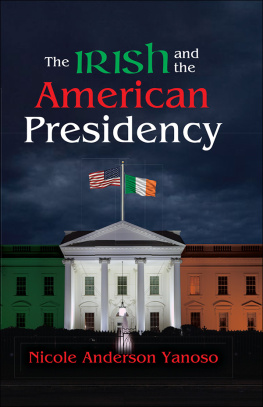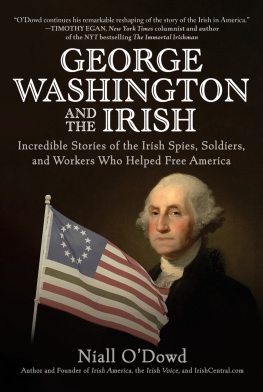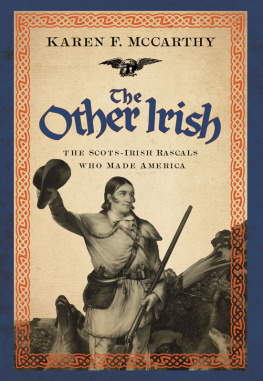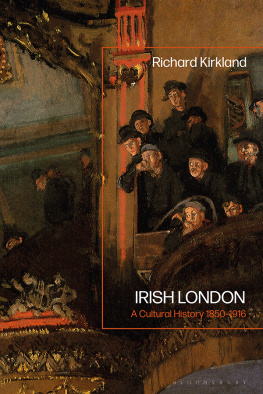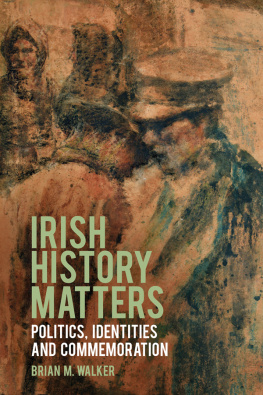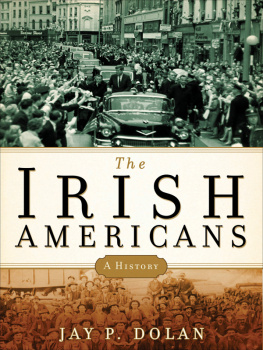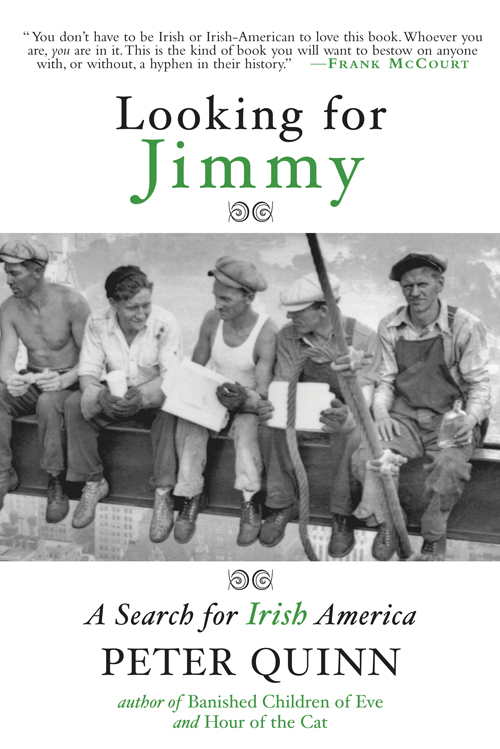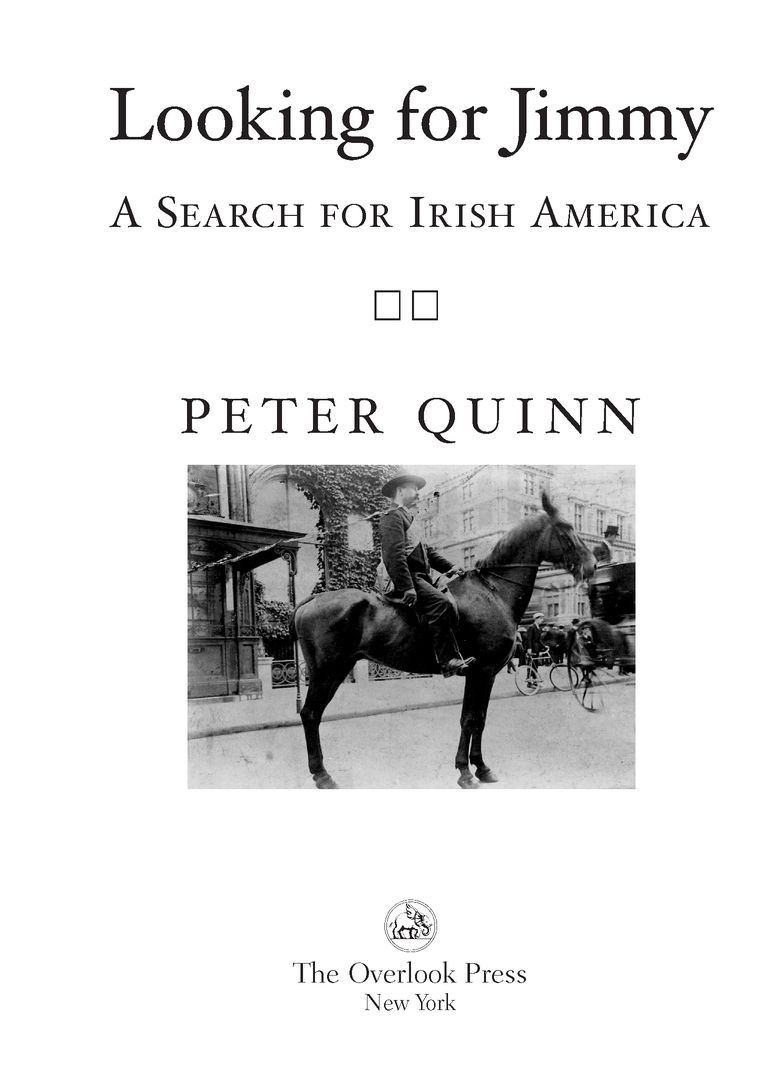Table of Contents
ALSO BY PETER QUINN
Banished Children of Eve
Hour of the Cat
For Thomas More Quinn,
twin, teacher, fellow traveler:
go raibh mle maith agat.
Foreword
I often vacillated about whether Jacks life was tragic, comic, or a bit of both, or merely a pathetic muddle. I admit the muddle theory moved me most at this point.
WILLIAM KENNEDY, Legs
A MIX OF REVERIE, REFLECTION, AND HISTORY, Looking for Jimmy: A Search for Irish America springs in part from a childhood fascination with relatives and elders who were dismissive of the past. The attitude they handed on, which Ive come to reject, was that the specifics of the past are unimportant and, in instances controversial, embarrassing, hurtful, or bloody, are best left to rest in peaceundisturbed and undiscussed.
Fathers and mothers, forgive me. I know what Im doing, and am doing it anyway.
This is a work in progress, a collection of previously unpublished pieces and, more often than not, articles and reviews substantially rewritten since they first appeared in print. The Skillins, which recounts a trip to Ireland in the early 1980s, was published in The Recorder: The Journal of the American Irish Historical Society. The Bronx Is Burning, an account of my short career as a court officer, has never before been published. The Perils of Pat expands on an article in Irish America Magazine. The focus varies from particulars of family history to the larger historical context, but the same process of exploration and investigation is at work throughout.
While my purpose with this volume isnt to provide definitive, one-size-fits-all answers, Ive tried (and will keep trying) not to avoid some basic questions. For example:
Q. Do you have a theory of history?
A. Doesnt everybody?
Q. Can you be more specific?
A. Could I be less?
Q. Then you have no theory?
A. If I didand Im not saying I doit would be close to William Kennedys take on Jack Legs Diamond: the muddle theory. Whether in myth, story, or history, human beings will always be driven to make sense of the past. (And by the way, history is a late entry in that quest, arriving with Herodotus and the Greeks, the day before yesterday, relatively speaking.) Marxists and free marketers view history through the solitary lens of economics. Creationists and believers see the clear workings of a divine plan. Evolutionists and geneticists equate human behavior with biology. On and on.
Neat, simple explanations beckon from left and right. Yet it seems to me that the deeper we dig into the microcosm, the farther out we push into the macrocosm, the subtler our analyses, the harder we delve into the morass of experience, the more we explore the interplay of heredity, history, and serendipity, then the more elusive the answer(s), the more ineffable the muddle. Ive tried to get at this in my novels, Banished Children of Eve and Hour of the Cat.
Q. Did you ever find Jimmy?
A. Those seeking to discover the whereabouts of any Jimmy living or deadincluding Jimmy Hoffashould ask for their money back. My Jimmy isnt an individual but an Irish-American attitude/essence/distillation.
Q. Are you true to history?
A. In my fashion. Looking for Jimmy is tentative, subjective and personal. The views and values it reflects were formed in the Bronx-based religious schools I attended from kindergarten through graduate school. A full account of the Irish in America would include the Protestant Scotch-Irish and the many Catholics who settled outside cities. As worthy as their stories are, they are not part of my tale. The Irish America of my search is the one into which I was borna cohesive urban Catholic community constructed from a peasantry fragmented, transplanted, transformed and defined by the Great Famine and its consequences.
The formative impact of the Famine, it seems to me, was paid little more than lip service, usually in the form of ritualized indictments of British treachery. Its always easier to assign blame for causes, I suppose, than to trace the profound, ordinary and subastral ways in which effects insinuate themselves into institutions and families, playing out across generations. If I beat this drum insistently, well, its because, through the decade of research and reflection that resulted in my first novel, I came to believe the beating was long overdue.
In youthful innocence, I aspired to academic accreditation as a historian. My intent was to learn Irish (only later did I add Irish-American) history and achieve if not peace with the past, then perspective. I proceeded to the last stages of a Ph.D. in history at Fordham University, where I was a graduate assistant to Professor Maurice OConnell, great-grandson of nineteenth-century Irish parliamentarian and political chieftain Daniel OConnell, The Liberator, who achieved Catholic emancipation but failed in his attempt to repeal the union with Great Britain.
I was fortunate to study under Maurice. Though we banged heads over his decidedly conservative interpretations of Irish history (he was a descendant of Irish landlords, I of Irish peasants), he was a mentor and friend. Along with Professor Frederick Schweitzer at Manhattan College, whose erudition and Catholic humanism profoundly affected my life, Maurice did his best to cultivate in me a preference for favoring facts over preconceptions and putting truth ahead of tribe. I treasure the words of approval that both these mentors bestowed on Banished Children of Eve.
Sadly, as a profession, history proved a bust for me. It turned out that the demographic wave I surfed into post-graduate studythe cresting swell of baby boomers now poised to crash on the ineluctable shore of universal mortalityhad already washed over academia, leaving in its wake beached and flopping schools of aspiring professors.
History let me down, but luck proved a lady. In 1979, just as I was beginning my dissertation, I published an article in the Jesuit weekly America entitled An American-Irish St. Patricks Day. As well as being my earliest public attempt to reflect on my background, the article led to me being hired as a speech writer for Governor Hugh Carey of New York, and to a quarter-century career as a political and corporate prose monger.
I made a good living mining words for mouths not my own, for which my family and I are grateful. But my heart was always elsewhere. The day job was just that. Pre- and post-work, my enduring/consuming interest remained history, a passion I pursued with fanatical regularity, rising early each morning to spend two hours at my own labors before turning to my income-producing responsibilities.
Thanks to that regimen, in addition to my novels, I was able to produce a steady stream of nonfiction pieces that appeared in, among other places, American Heritage, Commonweal, Eir-Ireland, America, World of Hibernia, et al. From 1986 to 1993, at the request of Dr. Kevin Cahill, another mentor, I was editor of The Recorder, a labor of love that allowed me to stay on top of developments in Irish/Irish-American historiography and writing. This book draws from that work. I take sole responsibility for its opinions, assertions, contradictions, and guesses.


